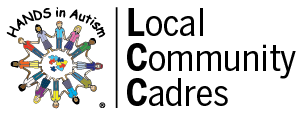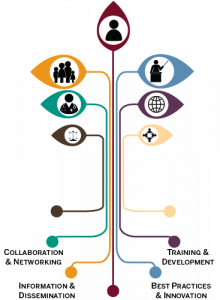Section 3: Available Supports
48 Local Community Cadres (LCCs)
About LCCs
 Local Community Cadres (LCCs) are regional community networks of families and professionals invested in serving individuals affected by autism spectrum disorder (ASD) and related developmental disabilities.
Local Community Cadres (LCCs) are regional community networks of families and professionals invested in serving individuals affected by autism spectrum disorder (ASD) and related developmental disabilities.
LCC Core Four
 The core elements central to all cadres to create meaningful and lasting change include:
The core elements central to all cadres to create meaningful and lasting change include:
1. Collaboration & Networking
LCCs encourage bridging and collaboration across diverse points of view to:
- Facilitate networking and dialogue with openness to diverse ideas.
- Promote the sharing of resources and information relevant to the local community.
- Create innovative interdisciplinary solutions.
2. Information & Dissemination
Dialogue between LCC chapters, HANDS in Autism® and local stakeholders encourage:
- Ongoing evaluation and identification of needs in the community.
- Reciprocal sharing of resources and tools based upon those identified needs.
- Creation of a mechanism to inform and disseminate regarding regional, state and national initiatives.
3. Training & Development
Development of community awareness of and capacity to support individuals with ASD and other developmental disabilities through training and professional development aimed at:
- Ensuring community awareness of available trainings and resources.
- Providing consistency in ASD knowledge across the community and its many systems.
- Advancing the capacity to both provide and sustain consistent knowledge and use of science-based methods of working with and supporting affected individuals and families.
4. Best Practices & Innovation
The interdisciplinary knowledge-base, connections, experience and skills of the LCC membership will encourage shared community responsibility and effort in addressing the needs of families and professionals supporting and caring for individuals with ASD and related disabilities that foster:
- Engagement at a systems level towards effective problem-solving and consistent practices.
- Facilitation towards development and sharing of solutions and resources related to local needs across systems.
- Using existing State and community resources to enhance local, as well as the broader statewide LCC action planning initiatives.
LCC Membership
Cadres are comprised of local, diverse, self-appointed stakeholders invested in addressing the needs of individuals and families affected by ASD and other related developmental disabilities. Membership is representative of the full range of supports across the lifespan.
Expectations of Membership
Community time and effort is needed to build effective supports for individuals with ASD and related disabilities that are relevant to each region. Members choose their level of participation based upon the time they feel they can commit to. All levels of participation are welcome and needed!
LCCs Activities & Community Contributions
Each LCC chapter is unique and connects (live or on-line) regularly to:
- Assess and Evaluate: Develop an understanding of community needs to be addressed and the status of current efforts using the ASD Needs Assessment and other data.
- Engage Stakeholders: Mobilize interest, consensus and support regarding the strategies used to address community needs and how to achieve positive outcomes.
- Develop an Action Plan: As a cohesive group, formulate an action plan for addressing the identified needs and achieving positive outcomes.
- Implement Strategies: Work together within the cadre and the community to implement strategies identified in the LCC action plan.
Activities pursued by each cadre are based on the identified needs of the region including, but not limited to:
- Workshops for parents, school personnel, medical professionals and community providers
- Community events and other networking initiatives
- Strategic dissemination of informational materials or resources
- Community participation in polls and surveys to inform LCC and State activities
State-wide Impact & Benefits of LCCs
In addition to addressing local needs, the cadres also inform the State’s Indiana Interagency Autism Coordinating Council (IIACC) regarding local challenges, needs and gaps in ASD services and supports. The IIACC represents major statewide partners and stakeholders and informs recommendations and feedback to the Family Social Services Administration (FSSA) Bureau of Developmental Disability Services (BDDS) regarding the state of ASD services, gaps and needs in Indiana. LCC members are encouraged to participate in quarterly IIACC meetings to represent their region as a Community Advisory Group (CAG) participant.
